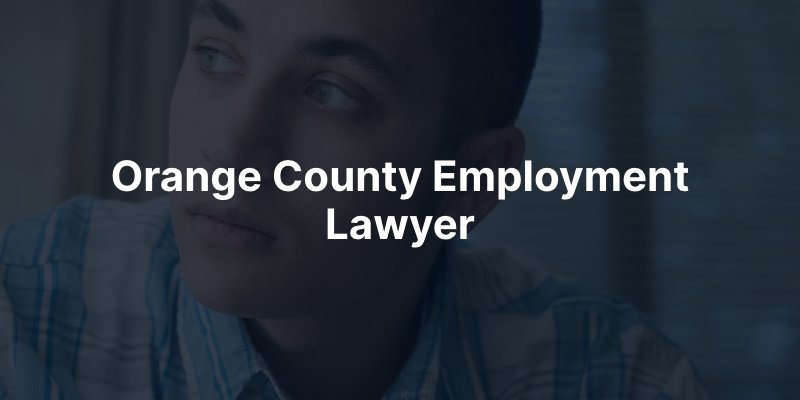Our Orange County Employment Lawyers are dedicated to representing employees who have faced injustices in the workplace. If you believe your rights have been violated, we will provide strong legal advocacy and pursue justice on your behalf. Call (949) 379-6250 or fill out our online contact form to arrange a free consultation today.

Our firm has fought for wronged employees for almost 20 years. With a history of securing millions in settlements and verdicts, we have earned a reputation for delivering positive outcomes for our clients.
Wrongful Termination Claims
If you were fired from your job without just cause or in violation of your employment contract, our Orange County wrongful termination lawyers will diligently investigate the circumstances surrounding your dismissal to determine whether you were wrongfully terminated.
Discrimination and Harassment Representation
If you have experienced discrimination or harassment based on protected characteristics such as race, gender, age, disability, or other factors, our legal team is committed to fighting for your rights. We provide compassionate representation, striving to hold employers accountable for creating a hostile work environment.
Wage and Hour Disputes
Our Orange County wage and hour dispute lawyers can help you address cases involving unpaid wages, overtime disputes, meal and rest break violations, and other issues related to compensation and working hours governed by federal and state labor laws.
Retaliation and Whistleblower Claims
Employees who face adverse actions for reporting illegal activities (whistleblowing) or exercising their legal rights may file claims for retaliation.
Employment Contract Disputes
Disputes arising from employment contracts, including issues related to terms, conditions, non-compete clauses, severance agreements, and breaches of contract.
Family and Medical Leave Act (FMLA) Violations
We represent employees who claim violations of their rights under FMLA, which provides eligible employees with job-protected, unpaid leave for specific family or medical reasons.
Employee Benefits and Retirement
Cases involving employers failing to provide promised benefits, discriminating against employees in benefit offerings, or mishandling retirement funds.
Workplace Safety and Health Violations
Employees may seek legal assistance if they believe their workplace fails to meet safety and health standards, leading to unsafe working conditions.
Disability Accommodation Claims
Employees with disabilities may file claims if they believe their employer failed to provide reasonable accommodations as required by the Americans with Disabilities Act (ADA) or state laws.
Workers’ Compensation
We can help you navigate the workers’ compensation claims process, ensure you receive the appropriate benefits, and assist you in appealing a denied claim.
Workplace Privacy Violations
Cases involving invasion of privacy, surveillance issues, or breaches of confidentiality in the workplace.
Independent Contractor Misclassification
We handle cases where workers have been misclassified as independent contractors instead of employees, impacting their rights to certain benefits and protections.
As an employee in California, you have various rights protected by state and federal laws, such as the following:

An employment attorney serves as a vital advocate in the fight against workplace discrimination. They possess in-depth knowledge of anti-discrimination laws and can assess the merits of your case and help you understand your rights and legal options. An employment attorney will handle all aspects of your claim, including investigating, documenting, and presenting evidence of discrimination. They will guide you through the complexities of filing a formal complaint and will work to secure a favorable settlement, which may include compensation, policy changes, or other remedies.
In instances where resolution through negotiation is not possible, an employment attorney can ensure that your voice is heard and your rights protected in administrative proceedings or court. Overall, an employment attorney will act as your dedicated ally, empowering you to challenge discrimination and seek justice in the workplace.
California has the following laws designed to safeguard the rights and well-being of workers:
Fair Employment and Housing Act (FEHA)
FEHA prohibits discrimination and harassment based on race, color, national origin, religion, sex, gender, sexual orientation, marital status, disability, and age. It applies to employers with five or more employees.
California Equal Pay Act
This law mandates equal pay for employees who perform substantially similar work, regardless of gender. It prohibits pay discrimination based on gender, race, or ethnicity.
Labor Code Section 1102.5 – Whistleblower Protections
This section protects employees who report workplace violations of law, regulations, or government contracts from retaliation.
California Minimum Wage Law
The state has its own minimum wage requirements, which are higher than the federal minimum wage. Employers must pay employees the higher of the two rates.
Meal and Rest Breaks
California labor laws mandate meal and rest breaks for employees.
Workers’ Compensation Laws
Employees have the right to file workers’ compensation claims for injuries or illnesses that occur in the course of employment.
California Privacy Laws
California has stringent privacy laws, including the California Consumer Privacy Act (CCPA), which provides certain privacy rights to employees regarding their personal information held by employers.
California Family Rights Act (CFRA)
CFRA provides eligible employees with up to 12 weeks of unpaid leave within a 12-month period to care for themselves or a loved one with a serious health condition or to bond with a new child.
Pregnancy Disability Leave (PDL)
PDL provides pregnant employees with up to four months of unpaid leave for pregnancy-related disabilities. It covers employers with five or more employees.
California WARN Act
The California Worker Adjustment and Retraining Notification (WARN) Act requires employers with 75 or more employees (unless it is related to a plant closure) to provide advance notice of mass layoffs or relocations, ensuring that employees have time to prepare for job loss.
Time Off for Voting
California law provides employees with the right to take time off work, without loss of pay, to vote in statewide elections if they do not have sufficient time outside of working hours to vote.
If you believe your employer has violated employment laws, taking the following proactive steps to protect your rights is crucial:
Document the Violation
Keep detailed records of the violation, including dates, times, locations, and individuals involved. Preserve any evidence, such as emails, text messages, witness statements, or photographs. This documentation can be critical in building a case if legal action becomes necessary.
Review Employment Contracts and Handbook
Look over your employment contract and company handbook to understand your rights and the company’s policies. This information can be essential to confirming a violation has occurred.
Raise the Issue Internally
Consider addressing the issue with your supervisor, human resources department, or another appropriate internal channel. In some cases, employers may be unaware of the violation, and they may take corrective action.
File a Complaint with Government Agencies
If internal resolution is not possible or if the violation persists, you may file a complaint with the relevant government agency. For example, California’s Civil Rights Department (CRD) or the federal Equal Employment Opportunity Commission (EEOC) for discrimination issues, or the Division of Labor Standards Enforcement (DLSE) for wage and hour violations.
Consult an Employment Attorney
Seeking legal advice is crucial to understanding your rights and options. A trusted Orange County Employment Attorney can provide guidance on how to proceed and advocate for you throughout the complaint process.
Explore Alternative Dispute Resolution (ADR)
Some cases can be resolved through alternative dispute resolution methods, such as mediation or arbitration. ADR can provide a faster and less formal process for resolving disputes.
Consider Joining or Initiating a Class Action Lawsuit
If the violation affects multiple employees, consider joining or initiating a class-action lawsuit. This collective approach can amplify the impact and address systemic issues within the organization.
Wrongful termination occurs when an employee is fired in violation of employment laws, contractual agreements, or public policy. Here are some examples of situations that may constitute wrongful termination:
If you believe you have been wrongfully terminated, an employment attorney can assess the circumstances and determine whether you have a case.
If you have experienced injustice in the workplace, contact Aegis Law Firm. From initial consultations to courtroom representation, our Orange County Employment Lawyer will provide dedicated legal representation tailored to your unique situation. Call (949) 379-6250 or reach us online through our contact form to arrange a free consultation today.